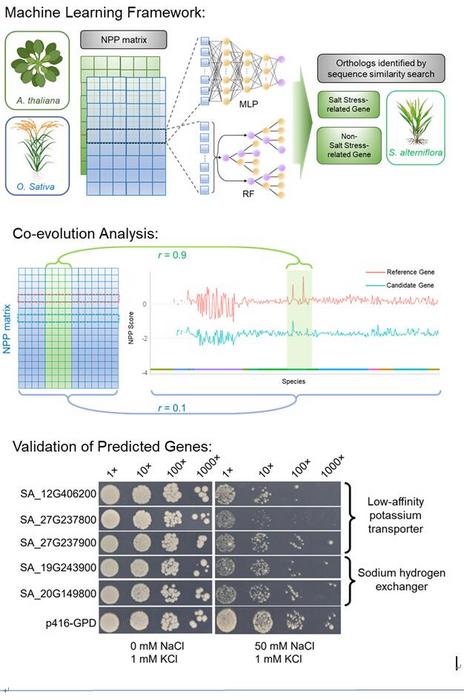This study is led by Professor Huihui Li (Institute of Crop Sciences, Chinese Academy of Agricultural Sciences, Beijing, China). The authors used a halophytic grass Spartina alterniflora as the target species, and Arabidopsis thaliana and rice as reference species to develop a salt stress-related gene mining method. The authors first aligned the amino acid sequences of all genes in the three species to the proteomes of 365 species, and constructed a normalized evolutionary information matrix. Subsequently, the author summarized and analyzed the clearly studied salt stress-related genes in the Arabidopsis and rice genomes through literature reviews.

Credit: Beijing Zhongke Journal Publising Co. Ltd.
This study is led by Professor Huihui Li (Institute of Crop Sciences, Chinese Academy of Agricultural Sciences, Beijing, China). The authors used a halophytic grass Spartina alterniflora as the target species, and Arabidopsis thaliana and rice as reference species to develop a salt stress-related gene mining method. The authors first aligned the amino acid sequences of all genes in the three species to the proteomes of 365 species, and constructed a normalized evolutionary information matrix. Subsequently, the author summarized and analyzed the clearly studied salt stress-related genes in the Arabidopsis and rice genomes through literature reviews.
By building a machine learning model, the authors determined the evolutionary information of salt stress-related genes in reference species, allowing cross-species characterization of homologous genes in target species. At the same time, the feature importance analysis of the machine learning model shows that the information in different evolutionary branches contributes differently to models’ prediction accuracies. Therefore, the authors used the CladePP method, which can perform phylogenetic profiling analysis at various evolutionary levels, to predict potential salt stress-related genes. The results showed that genes that highly co-evolved with known salt stress-related genes were concentrated in biological processes such as ion transport, response to toxic substances, and detoxification metabolism.
Through this gene mining strategy, the authors identified five genes encoding ion transporters, and all of them were experimentally verified to have the ability of sodium ions uptake. In summary, this work confirms the feasibility of using evolutionary information to mine salt stress-related genes and demonstrates the great potential of combining phylogenetic profiling with machine learning algorithms in plant functional genomics research.
See the article:
Mining salt stress-related genes in Spartina alterniflora via analyzing coevolution signal across 365 plant species using phylogenetic profiling
Journal
aBIOTECH
DOI
10.1007/s42994-023-00125-5
Article Title
Mining salt stress-related genes in Spartina alterniflora via analyzing co-evolution signal across 365 plant species using phylogenetic profiling
Article Publication Date
7-Dec-2023




